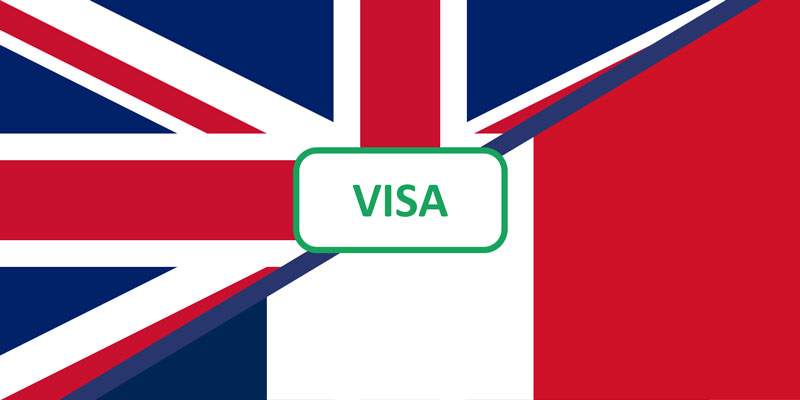Due to Brexit, moving around Europe has become a lot more complicated for Brits, especially those wanting to move abroad, whether that be for professional purposes, to study, or just to experience life in another country. In this article, we will outline the different reasons for needing a visa to travel to France, as well as the different types of visas and what you may need, focusing particularly on the requirements for studying in France as a Brit.
Who needs a visa to travel to France?
efore Brexit, Brits were free to travel around Europe as they pleased, but now there are travel restrictions and requirements that you need to be aware of, and these vary depending on both the country and reason for travel. The biggest and most important change being the need for visas, but there has been a lot of confusion around who needs a visa to travel, and what type they need.
When Brexit was introduced, along with it came the 90-day rule. This means that anyone holding a British passport is able to travel within the Schengen area as much as they like for 90 days within a 180-day period, but if they wish to travel for more than 90-days, they would need to apply for a visa. So, if you are planning on moving to France for study, work, or any other reason for less than 90 days, there is no need for you to apply for a visa, but once these 90 days are up (from the first day of travel), you may not enter any other country within the Schengen area for another 90 days.
In order to keep track of how many days you can stay (or how many days you have available), you may also click the following link to access a free online calculator : https://visaguide.world/europe/schengen-visa/schengen-calculator/
If you wish to move to France either permanently or temporarily for longer than 90 days, you will need to apply for a long-stay visa, but the type of visa that you need will depend on your reasons for travel. Once you have this long-stay visa, any travel within France will not go towards your 90-day visa free travel, meaning you still have these days to use for travelling within the Schengen area.
What are the different types of visa?
- Extended period for tourism or personal reasons
- To carry out professional activities
- For educational purposes
- To join family members already living in France
Each category will have slightly different requirements depending on your reason for travel, so be sure to check the France-visas website for a definitive list of required documents.
What are the costs involved in applying for a French visa?
The first is a charge of GBP 35 which is paid to the TLS Centre when you book your appointment, this is a non-refundable service fee. The second is a charge of EUR 50 to be paid when you validate your visa upon arrival in France, which confirms your residence.
Any other costs incurred will vary depending on the visa being applied for and your individual circumstance. For student visas, the price is GBP 85.49 (EUR 99), although this may change depending on your circumstances. There is currently no need to have any documents legalised or translated, however the requirements will be different for each visa category, so be sure you have checked this in advance. You will also have the option to collect your visa from the TLS centre once the process is complete, or to have it posted back to you for an extra GBP 15.40.
Student visa- who can apply?
The student visa is available for anyone wishing to travel to France as part of their studies, whether they will be studying in a university, enrolled in a language school, or completing an internship related to their studies back home. Any student wishing to study or complete an internship in France for less than 90 days does not need to apply for a visa.
What documents are needed to apply for a visa?
- A valid passport :
- Fully-completed visa application form
- Three standardised passport photos
– Issued within the last 10 years
– Valid for at least 3 years after the planned departure from France
What documents are required for applying for a student visa?
- Complete the Études en France (EEF) procedure: this is the online platform on which students must make a request to be enrolled in a higher education institute in France. There is a fee for using this service
- Provide proof of financial means: 615€ per month*
- Provide proof of accommodation in France**
If you are travelling to France on a student visa to complete an internship, along with the documents mentioned above, you will also be required to:
- Provide a Convention de Stage, provided to the student by the UK university. This must be signed by the student, the home university and the host organisation. Once signed by all parties, your employer must have this validated before you can apply for your visa.
- Provide proof of financial means EUR 1480 per month*
- Provide proof of accommodation**
- Provide a valid health insurance and/or GHIC card
The requirements for those wishing to travel to France on a student visa for purposes other than to complete a university course or an internship may be different, and these requirements can be found on the France-visas website.
** Proof of accommodation should be either a contract signed between yourself and your landlord, a booking confirmation, or a letter from a host inviting you to live with them.
How to apply for the student visa
What to do upon arrival in France
If your visa acts as your residence permit, you will need to validate it online within three months of arriving in France. This costs EUR 50, and it is compulsory. Without this validation, you will not be considered a legal resident in France and you will be unable to re-enter the Schengen area.
If your accompanying letter tells you that you need to request a carte de séjour, or residence permit, you must do this at your local prefecture within two months of your arrival in France. This is usually only required if you will be staying in France for longer than one year.
Visa support
Here is a list of resources that may be helpful for additional information when applying for a French visa:
https://france-visas.gouv.fr/en/
https://www.tlscontact.com/
https://www.gov.uk/foreign-travel-advice/france/entry-requirements
https://www.service-public.fr/particuliers/vosdroits/F16162?lang=en




